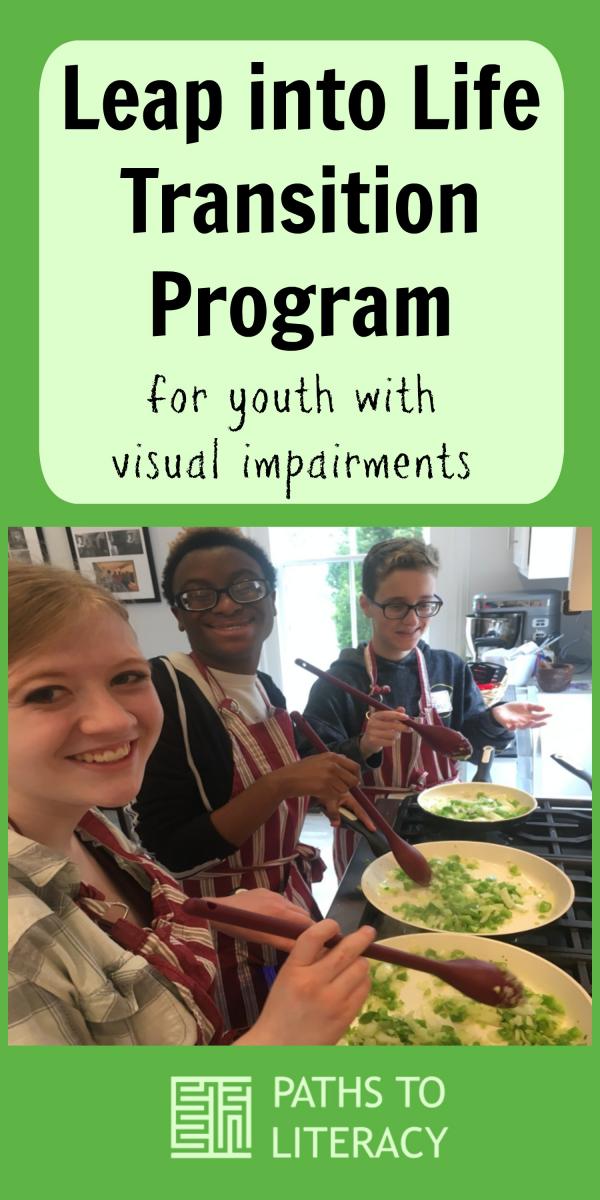Leap into Life (LIL) Transition Program
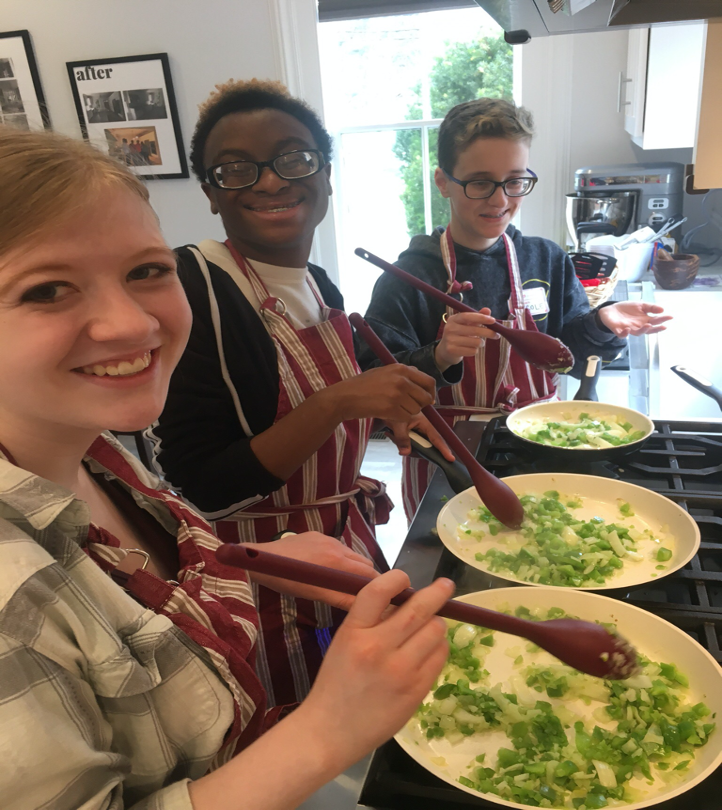 Leap into Life (LIL) is a transition program developed and implemented by Teachers of the Visually Impaired for The Bureau of Education and Services for the Blind in the state of Connecticut.
Leap into Life (LIL) is a transition program developed and implemented by Teachers of the Visually Impaired for The Bureau of Education and Services for the Blind in the state of Connecticut.
The Bureau of Education and Services for the Blind, BESB provides opportunities for students to prepare for their future. BESB has created, developed and implemented a program for teens in transition. During the past four years, LIL has provided students with community field trips and social experiences. Students are offered opportunities to socialize with their peers, participate in outdoor adventures and gain experience in the community. The focus of the program is to prepare students for their futures and an active fulfilling life.
How does it work?
The LIL program is offered to academic students in grades 9 through 12. The program is for transition students planning to attend college and live an independent life. Guidelines were established to include the appropriate students and help families understand the requirements for acceptance into the program. See LIL guidelines below.
Students in 8th grade can join the end of the year event prior to entering high school. This event acknowledges the students graduating, and honors the student for their efforts in their ECC (Expanded Core Curriculum) accomplishments.
Committee structure:
The LIL committee is a group of dedicated Teachers of the Visually Impaired and Orientation and Mobility Instructors working together to create programs to address the ECC. We are all committed to preparing our students for their future.
- There are 5 members, plus a chairperson.
- Each committee member develops and implements one program, giving LIL the ability to offer 5-6 ECC programs per school year.
- Sub-committees were created to break down the duties and responsibilities.
- Recruiting / promotion / correspondence
- Permission forms / parental consent / event waivers
- Planning and development
- Documentation / case notes /photos and committee obligations
- Planning and development are on-going, but the majority of the planning for the upcoming school year is done in June. By the end of each school year our goal is to have the first two – three events planned, with the dates and locations, identified for the next school year.
Learning By Design
Student Learning Outcomes:
- Developed a greater sense of well being
- Became confident involved learners
- Emerging team players
- Transformed their independence
- Grew socially
“Education is the most powerful weapon which you can use to change the world.” -- Nelson Mandela
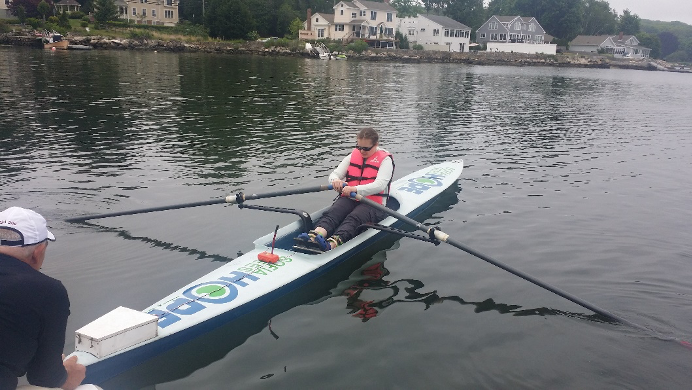
Leap into Life Guidelines:
Leap into Life, LIL, is a transition program developed for BESB clients who are planning to transition to college and a career.
For a student to be eligible for the Leap into Life Programs, they must have the following pre-requisite skills:
- The student demonstrates complete independence in daily personal care and is planning to live independently.
- The student is personally motivated to participate in the LIL program to increase their level of independence in community travel, participate in new recreation and leisure activities and be interested in an independent and healthy lifestyle.
- The student is capable of self-managing their behavior, getting along with others in a group setting and be safe with minimal supervision.
The objective of the LIL program: Step Back So The Student Can Step Up
LIL is designed to provide our students with opportunities to experience and practice independence in a safe environment. This program is developed to build on existing skills for the blind and visually impaired student so they can acquire the skills needed when they transition to an independent life, college and mature social settings. Our teachers will oversee the program but will not micromanage the students. We want our students to spend time with each other in a social environment and learn from one another.
The LIL Program and the ECC Goals
Addressing the Expanded Core Curriculum (ECC)
Social Skills: Helping students develop interpersonal relationships
- students make lifelong connections
- students connect outside of the program
- discussions have included personal space
- how to effectively communicate to others if they make you fell uncomfortable
- social media
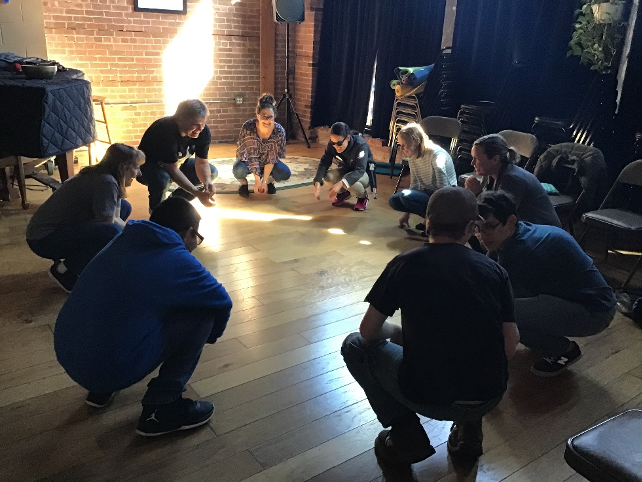
Recreation & Leisure – Providing students the opportunities to experience and participate in leisure activities that may otherwise not be considered without the support of a team of TVI’s and O&M instructors.
Programs offered:
- Hiking – A blind hiker was a mentor to the students as they hiked a trail at Parmelee Farms in Killingworth, CT.
- Rock Climbing – Students develop strength and mobility participating in an indoor climbing gym.
- Zip Lining – Students overcome their fears with an amazing team from Empower Zip Lining. Students were in the woods of CT in trees as high as 80 feet, walking an obstacle course and zip lining from tree to tree.
- Skiing –Through an adaptive ski program the students receive instruction, ride a chair lift and ski the slopes.
- Water sports – With the ingenuity of a crew coach students were able to ride solo on a canoe, crew or kayak. The coach designed a remote control that controlled the rudders of the boat. Special adaptations were made for a deaf blind kayaker.
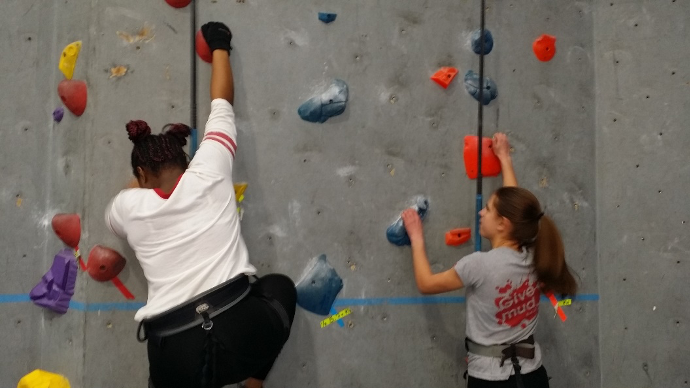
Self Determination – Helping students gain the confidence to become effective advocates and value who they are. Through carefully planned events students develop the confidence to use their voice effectively to communicate their needs.
- Speak Up – BESB hired renowned Moth champion Mathew Dicks to present a session on storytelling. The program provided students with the skills to develop and deliver a story.
- Self-Defense Program – Survival Skills for Teens with a Visual Impairment. BESB teamed up with Jane Doe No More and East Coast Training to deliver a program on topics of inappropriate touch, what to do if you are in an unsafe situation, “what to look for, how to avoid it, and what to do when the worst case is unavoidable." Students also learned self-defense moves to protect themselves from a physical attack.
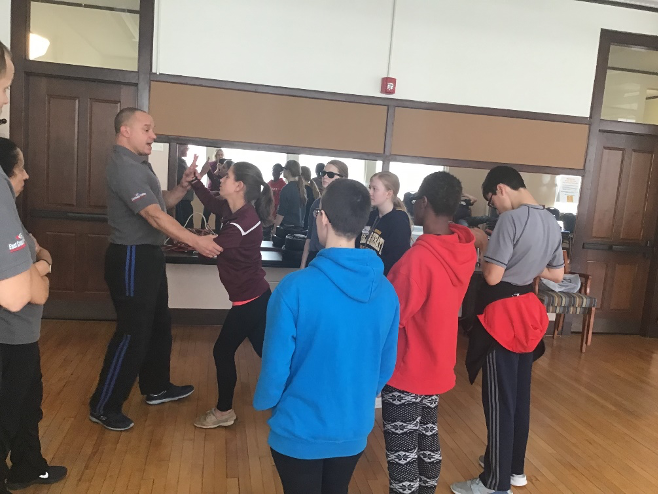
Technology – The social aspect of the events brings the students together to see how each student personalizes their technology
Orientation & Mobility – Let’s Unite using the cane – The LIL program promotes a safe and secure environment for students to feel comfortable using their canes. Students who don’t typically use their cane in school are encouraged to use their cane. Orientation and Mobility instructors attend the programs.
- Community travel – students traveled on Metro North, a commuter rail, lesson plans including the gap, how to purchase train tickets, how to travel safely in a parking lot.
- Street crossings
- A chance for students to be out in the community with peers who are cane users.
Career Education
- College day – BESB and CCSU (Central CT State University), teamed up to offer students a day at college. Students toured the campus, met with a disability’s coordinator, BESB’s VR counselor and then experienced lunch in a complex kiosk market. Attendance was high, initially 21 students registered, the day of 16 students attended.
Independent Living Skills – BESB created and developed a cooking program that emphasizes a healthy diet and lifestyle and builds skills over the three-day program.
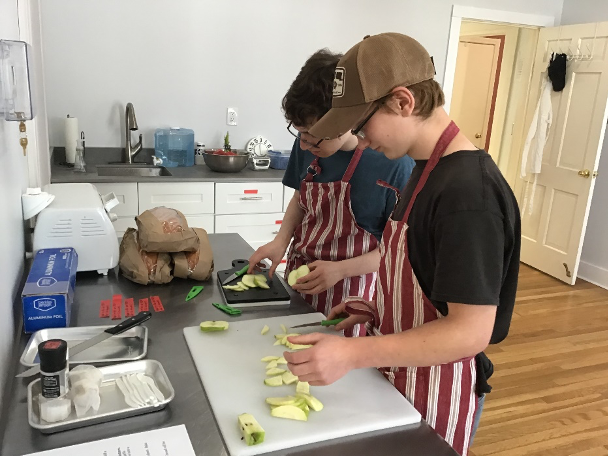
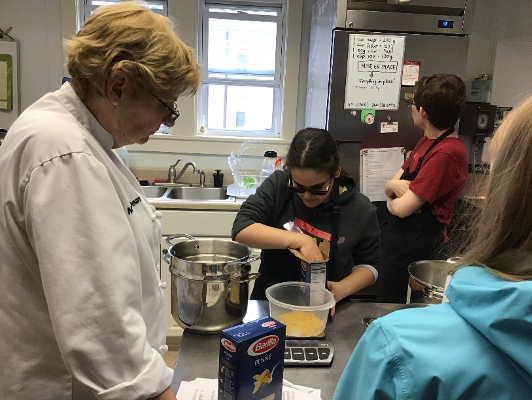
The Cooking Connection Outcome:
- During the cooking program the students made themselves breakfast and lunch.
- Prepared a dinner to take home and made a cake from scratch.
- Some of the students attended because they wanted to, while some attended because their parents asked them to.
- The students left the program socially connected and more confident in the kitchen.
- Students provided positive feedback to all activities.
- The students were impressed with the adaptive cooking tools and they took home a present of what they made.
- At the end of three days the students wanted to know why it wasn’t five days.
- The committee chair received thank you phone calls and emails complimenting the program and “please let us know when the next program is”.
- Food items prepared: French toast & bacon, quesadillas, cakes baked from scratch, cooking pasta or tortellini, salad, garlic bread, and homemade macaroni & cheese.
Teamwork
Working together to create and share meals
The Cooking Connection
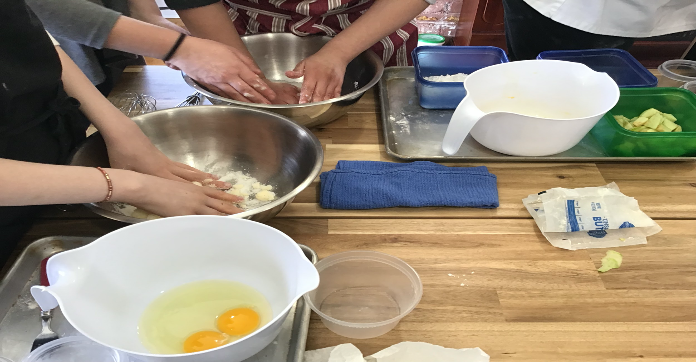 Acquired skills:
Acquired skills:
- Chopping
- Peeling
- Cutting
- Shredding
- Weights and measures
- Seasoning
- Whisking
- Knife safety
- Sanitation
- Preheating
- Mise en Place
Equipment used:
- Blender
- Foreman grille
- Talking scale
- LP & Braille timer
- Microwave
- Cooktop
- Oven
- Chef’s knife
- Whisk
- Bench scraper
- Peeler
Why are some programs more successful than others?
- We’ve learned that students like sporting activities.
- We always have a full turn out for events such as zip lining or rock climbing. It’s nice to see that our students are age appropriate. We encourage our students to attend all events, but the sporting programs have been the most successful.
- Important events with lower turn outs include self-defense, storytelling, hiking, and adaptive movie. These events where ultimately successful, but were just harder to market, and the attendance ranged from 8 - 10 participants. Even though the numbers were lower than other programs, they were successful based on the students' input.
LIL Committee
Lessons Learned
- Don't be afraid to run the same successful programs year after year (e.g. cooking, rock climbing, skiing, etc.). Some of our students may only come once a year to that special event that piqued their interest.
- When scheduling, try to look at school breaks, weekend days, summer months when attendance at school is not required. Stay away from exam times and other big school year events. Our students are academically conscientious and typically do not like to miss school.
- Try to incorporate an adult blind mentor who has experience in the field trip.
- The social connection is invaluable. Provide "down time" during the event to enable the students to make one-on-one connections with their peers, as this may be their only opportunity to be with other students with a visual impairment.
- Arrange small groups of car-pooling so students begin the connection prior to the start of the event.
- Reach out to the community or a small business. Let them know who you are and who you service. There are plenty of organizations willing to support and modify their program to accommodate our students. Many of our programs have been provided on a limited budget. Our group has never been turned away from a request. Some activities take a little more planning time. Some activities require staff training and education for the staff before the event becomes a reality.
- Survey the students and the parents to get feed-back and learn what works and what doesn’t. Don’t shy away from difficult topics. We did a self-defense program that spoke about keeping safe and some of the issues were delicate. For these events we make it mandatory that parents attend.
- Listen to the student and what their interests are. Plan events around their suggestions to get more participants. The kids we are targeting are academic and college-bound. They have busy lives just like the rest of us. Even if you get a small turnout for one event, the next one might be a record breaker (for example, 16 students attended college day).
